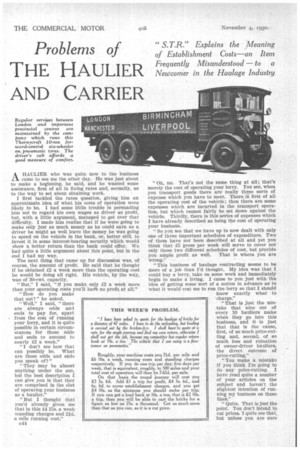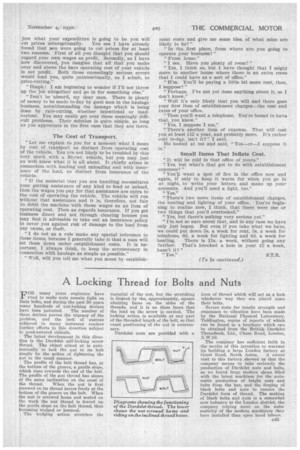Problems of
Page 74

Page 75

If you've noticed an error in this article please click here to report it so we can fix it.
THE HAULIER AND CARRIER
" S.T.R." Explains the Meaning of Establishment Costs—an hem Frequently Misunderstood — to a Newcomer in the Haulage Industry
A HAULIER who was quite new to the business .C1 came to see me the other day. He was just about to make a beginning, he said, and he wanted some assistance, first of all in fixing rates and, secondly, as to the way to set about obtaining work.
I first tackled the rates question, giving him an approximate idea of what his costs of operation were likely to be. I had some little trouble in persuading him not to regard his own wages as driver as profit, but, with a little argument, managed to get over that difficulty. I made him realize that if he were going to make only just as much money as he could earn as a driver he might as well leave the money he was going to spend on the vehicle in the bank, or, better still, to invest it in some interest-bearing security which would show a better return than the bank could offer. We had quite a little argument about this point, but in the end I had my way.
The next thing that came up for discussion was, of course, the amount of profit. He said that he thought if he obtained £2 a week more than the operating cost he would be doing all right. His vehicle, by the way, was of 30-cwt. capacity.
"But," I said, "if you make only 12 a week more than your operating costs you'll have no profit at all." "How do you make that out?" he asked.
"Well," I said, "there are always odds and ends to pay for, apart from the cost of running your lorry, and it is quite possible in certain circumstances for those odds and ends to amount to nearly £2 a week."
"I don't see how that can possibly be. What are these odds and ends you speak of?"
"They may be almost anything under the sun, but the best description I can give you is that they are comprised in the thst of operating your business as a haulier."
"But I thought that you'd already given me that in this £4 15s. a week standing charges and nd. a mile running cost."
c44 "Oh, no. That's not the same thing at all; that's merely the cost of operating your lorry. You see, when you transport goods there are really three sorts of expense which you have to meet. There is first of all the operating cost of the vehicle; then there are some expenses which are incurred in the transport operation, but which cannot fairly be set down against the vehicle. Thirdly, there is this series of expenses which I have already described as being the cost of operating your busineSs.
"So you see that we have up to now dealt with only one of three important schedules of expenditure. Two of them have not been described at all and yet you think that £2 gross per week will serve to cover not only those two different schedules of cost, but provide you ample profit as well. That is where you are wrong."
"This business of haulage contracting seems to be more of a job than I'd thought. My idea was that I could buy a lorry, take on some work and immediately begin to make a living. I came to you just with the idea of getting some sort of a notion in advance as to what it would cost me to run the lorry so that I should know exactly what to charge."
"That is just the mistake that nine out of every 10 hauliers make when they go into this business, and it is just that that is the cause, first, of so much price-cutting and, second, of so much loss and ruination of owner-driver hauliers, the direct outcome of price-cutting."
"You make a mistake if you think I'm going to do any price-cutting. I have read quite a number of your articles on the subject and haven't the slightest intention of running my business on those lines."
"Quite. That is just the point. You don't intend to cut prices. -I quite see that, but unless you are sure
just what your expenditure is going to be you will cut prices uninteptionally. You see I have already found that you were going to cut prices for at least two reasons. First of all you thought that you should regard your own wages as profit. Secondly, as I have now discovered, you imagine that all that you make over and above the bare operating cost of your vehicle is net profit. Both those exceedingly serious errors would lead you, quite unintentionally, as I admit, to price-cutting."
" lImph I am beginning to wonder if I'll not throw up the job altogether and go in for something else."
"Don't be absurd, my dear man. There is plenty of money to be made to-day by good men in the haulage business, notwithstanding the damage which is being done by rate-cutting, whether intentional or inadvertent. You may easily get over these seemingly difficult problems. Their solution is quite simple, so long as you appreciate in the first case that they are there.
The Cost of Transport.
"Let me explain to you for a moment what I mean by cost of transport as distinct from, operating cost of the vehicle. You are not likely to be troubled by this very Much with a 30:cwt. vehicle, but you may just as well know what it is all about. It chiefly arises in connection with loading and unloading and with insurance of the load, as distinct from insurance of the vehicle. • • "If the material that you are handling necessitates your getting assistance of. any kind to load or unload, then the wages you -pay for that assistance are extra to the cost of operating the vehicle. The vehicle will run Without -that assistance and it is, therefore, not fair to debit the machine with those wages as an item of operating, cost. Then as regards insurance. If you get business direct and not through clearing houses you may find it advisable to take out an insurance policy to cover you against risk of damage to the load from any cause, or theft.
"I do not as a rule make any special reference to these items, because I generally take it that a man will Set them down under establishment costs. It is important, I always think, to keep the accountancy in Connection with haulage as simple as possible."
"Well, will you tell me what you mean by establish ment costs and give me some idea of what mine are likely to be?"
"In the first place, from where are you going to operate your business?"
"From home."
'1 see. Have you plenty of room?"
" Yes, I think so, but I have thought that I might move to another house where there is an extra room that I could have as a sort of office."
"H'm. You'll be paying a little bit more rent, then, I suppose?"
"Perhaps. I've not yet done anything about it, so I don't know."
"Well it's only likely that you will and there goes your first item of establishment charges—the rent and rates of your office.
"Then you'll want a telephone. You're bound to hava that, you know."
"Yes, I suppose I am."
"There's another, item of expense. That will cost you at least £12 a -year, and probably more. It's rather cold to-day, isn't it?" I said.
He looked at me and said, " Yes—er—I suppose it is."
Small Items That Inflate Cost.
"It will be cold in that office of yours."
"Yes, but what's that got to do with establishment expenses?"
"You'll want a spot of fire in the office now and again, if only to keep it warm for when you go in at night to write your letters and make up your accounts. And you'll need a light, too."
"Yes."
" There's two more items of establishment charges, the heating and lighting of your office. You're beginning to realize now, I think, that there were one or two things that you'd overlooked."
" Yes, but there's nothing very serious yet."
"I'm not so sure about that, and in any ca-se we have only just begun. But even if you take what we have, we could put down 5s. a week for rent, 5s. a week for telephone, 6d. a week for lighting and 6d. a week for
heating. There is us. a week, without going any farther. That's knocked a hole in your £2 a week, hasn't it "
yes." S.T.R.
(To be continued.)




























































































































